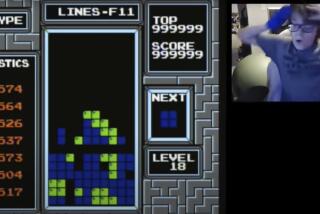Tetris to ease war anguish?
- Share via
Aficionados of the computer-based game Tetris describe the manipulation of its geometric shapes as mind-bending, time-expending and utterly absorbing. But an inoculation against the mental anguish of war memories? Who’d have guessed it?
A study published in the latest issue of the online journal PLoS One found that research subjects who played Tetris in the immediate wake of witnessing a traumatic event were less likely than those who did not play Tetris to experience disturbing, intrusive memories of the horror.
Such distressing flashbacks are a key symptom of post-traumatic stress disorder, a psychiatric diagnosis given to as many as 1 in 5 U.S. service personnel returning from Iraq and Afghanistan. Effective treatments for the disorder -- or better yet, preventive measures -- are in high demand.
In the study, conducted at Oxford University’s Department of Psychiatry, 40 subjects between 18 and 47 viewed a 12-minute film that included horrific images of physical injury and death. After a half-hour break during which subjects were kept busy filling out forms, 20 of the subjects were set before a computer screen to play Tetris for 10 minutes. The remaining 20 sat quietly with nothing to do.
Not surprisingly, perhaps, the Tetris players reported fewer flashbacks to the scenes of injury and death during the 10-minute period than did the group that did nothing. But in a daily diary kept for a week after they viewed the film, Tetris players reported fewer flashbacks than did the group left to entertain themselves in the movie’s wake.
Tested for PTSD symptoms in the lab a week after watching the film, the Tetris players showed significantly less evidence of trauma than did the control group.
And yet the Tetris-playing group’s memories of the events in the film were perfectly intact, the researchers found. Apparently, they had lost their power to horrify.
What saved the Tetris-playing group from post-traumatic stress symptoms was the limited powers of the brain to perform two similar operations at the same time, the authors wrote. In the crucial period after the film, the Tetris players were too engaged in game-playing, which taxed their visual and spatial processing skills, to consolidate the upsetting memory of the film and their own physiological distress, the authors conjectured.
Without this stored version of events, the Tetris players had only their more dispassionate narrative memory.
As PTSD diagnoses have grown among troops, computer and video games have been explored as a means of desensitizing soldiers to frightening memories. But the Tetris experiment takes the use of video and computer games in a different direction -- as a means to “jam” the mental process of recording frightening events.
--







